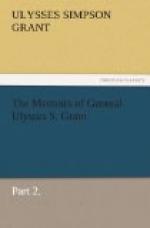I witnessed the scene. I had heard of the surrender of the camp and that the garrison was on its way to the arsenal. I had seen the troops start out in the morning and had wished them success. I now determined to go to the arsenal and await their arrival and congratulate them. I stepped on a car standing at the corner of 4th and Pine streets, and saw a crowd of people standing quietly in front of the head-quarters, who were there for the purpose of hauling down the flag. There were squads of other people at intervals down the street. They too were quiet but filled with suppressed rage, and muttered their resentment at the insult to, what they called, “their” flag. Before the car I was in had started, a dapper little fellow—he would be called a dude at this day —stepped in. He was in a great state of excitement and used adjectives freely to express his contempt for the Union and for those who had just perpetrated such an outrage upon the rights of a free people. There was only one other passenger in the car besides myself when this young man entered. He evidently expected to find nothing but sympathy when he got away from the “mud sills” engaged in compelling a “free people” to pull down a flag they adored. He turned to me saying: “Things have come to a —— pretty pass when a free people can’t choose their own flag. Where I came from if a man dares to say a word in favor of the Union we hang him to a limb of the first tree we come to.” I replied that “after all we were not so intolerant in St. Louis as we might be; I had not seen a single rebel hung yet, nor heard of one; there were plenty of them who ought to be, however.” The young man subsided. He was so crestfallen that I believe if I had ordered him to leave the car he would have gone quietly out, saying to himself: “More Yankee oppression.”
By nightfall the late defenders of Camp Jackson were all within the walls of the St. Louis arsenal, prisoners of war. The next day I left St. Louis for Mattoon, Illinois, where I was to muster in the regiment from that congressional district. This was the 21st Illinois infantry, the regiment of which I subsequently became colonel. I mustered one regiment afterwards, when my services for the State were about closed.
Brigadier-General John Pope was stationed at Springfield, as United States mustering officer, all the time I was in the State service. He was a native of Illinois and well acquainted with most of the prominent men in the State. I was a carpet-bagger and knew but few of them. While I was on duty at Springfield the senators, representatives in Congress, ax-governors and the State legislators were nearly all at the State capital. The only acquaintance I made among them was with the governor, whom I was serving, and, by chance, with Senator S. A. Douglas. The only members of Congress I knew were Washburne and Philip Foulk. With the former, though he represented my district and we were citizens of the same town,




